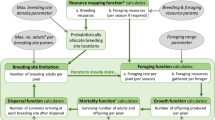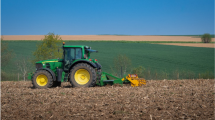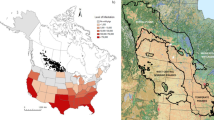Abstract
In recent years, elk have begun recolonizing areas east of the Rocky Mountains that are largely agro-forested ecosystems composed of privately owned land where management of elk is an increasing concern due to crop and forage depredation and interspecific disease transmission. We used a Geographic Information System, elk use locations (n = 5013), random locations (n = 25,065), discrete-choice models, and information-theoretic methods to test hypotheses about elk resource selection in an agro-forested landscape located in the Pine Ridge region of northwestern Nebraska, USA. Our objectives were to determine landscape characteristics selected by female elk and identify publicly owned land within the Pine Ridge for potential redistribution of elk. We found distance to edge of cover influenced selection of resources by female elk most and that in areas with light hunting pressure, such as ours, this selection was not driven by an avoidance of roads. Female elk selected resources positioned near ponderosa pine cover types during all seasons, exhibited a slight avoidance of roads during spring and fall, selected areas with increased slope during winter and spring, and selected north- and east-facing aspects over flat areas and areas with south-facing slopes during winter months. We used our models to identified a potential elk redistribution area that had a higher proportion of landcover with characteristics selected by elk in our study area than the current herd areas and more landcover that was publicly owned. With appropriate management plans, we believe elk within the Potential Elk Redistribution Area would predominantly occupy publicly owned land, which would help minimize crop and forage damage on privately owned lands.



Similar content being viewed by others
References
Anderson DP, Turner MG, Forester JD, Zhu J, Boyce MS, Beyer H, Stowell L (2005) Scale-dependent summer resource selection by reintroduced elk in Wisconsin, USA. Journal of Wildlife Management 69:298–310
Baasch DM, Tyre AJ, Millspaugh JJ, Hygnstrom SE, VerCauteren KC (2010) An evaluation of three statistical methods used to model resource selection. Ecological Modeling 221:565–574
Beyer DE (1987) Population and habitat management of elk in Michigan. Dissertation, Michigan State University, East Lansing, USA
Boyce MS, Turner MG, Fryxell J, Turchin P (2003) Scale and heterogeneity in habitat selection by elk in Yellowstone National Park. Ecoscience 10:421–431
Bryant LD, Thomas JW, Johnson BK, Noyes JH (1991) Hunter and Rocky Mountain elk (Cervus elaphus nelsoni) interactions in the Starkey Experimental Forest and Range. In: Christensen AG, Lyon LJ, Lonner TN (eds) Proceedings of the Elk vulnerability symposium. Montana State University, Bozeman, USA, pp 168–173
Burcham M, Edge WD, Marcum CL (1999) Elk use of private land refuges. Wildlife Society Bulletin 27:833–839
Burnham KP, Anderson DR (2002) Model selection and multi-model inference: a practical information-theoretic approach, 2nd edn. Springer-Verlag, New York, New York, USA
Burnham KP, Anderson DR (2004) Multimodel inference: understanding AIC and BIC in model selection. Sociological Methods and Inference 33:261–304
Cogan RD (1996) Management plan for elk in Pennsylvania. Bureau of Wildlife Management, Pennsylvania Game Commission, Harrisburg, Pennsylvania, USA
Cook JG, Irwin LL, Bryant LD, Riggs RA, Thomas JW (1998) Relations of forest cover and condition of elk: a test of the thermal cover hypothesis in summer and winter. Wildlife Monograph No. 141
Cover M (2000) Ecology of elk in the Pine Ridge of Northwestern Nebraska: seasonal distribution, characteristics of wintering sites, and herd health. Thesis, University of Nebraska, Lincoln, USA
Didier KA, Porter WF (1999) Large-scale assessment of potential habitat to restore elk to New York State. Wildlife Society Bulletin 27:409–418
Fielding AH, Bell JF (1997) A review of methods for the assessment of prediction errors in conservation presence/absence models. Environmental Conservation 24:38–49
Forbes KM (2001) Modeling big horn sheep habitat in northwest Nebraska. Thesis, University of Nebraska, Lincoln, USA
Fricke KA, Cover MA, Hygnstrom SE, Groepper SR, Genoways HH, Hams KM, VerCauteren KC (2008) Historic and recent distributions of elk in Nebraska. Great Plains Research 18:189–204
Geist V (1982) Adaptive behavioral strategies. In: Thomas JW, Toweill DE (eds) Elk of North America-ecology and management. Stackpole Books, Harrisburg, Pennsylvania, USA, pp 219–277
Howlin S, Erickson WP, Neilson RM (2004) A validation technique for assessing predictive abilities of resource selection functions. In: Huzurbazar S (ed) Resource selection methods and applications. Omnipress, Madison, Wisconsin, USA, pp 40–51
Hygnstrom SE, Cover MA, Stillings BA, Crank RD, Fischer JW, Merchant JW, Korte SP (2005) Elk in Nebraska: opportunity or another private-public land conundrum. Proceedings of the Wildlife Damage Management Conference 11:213–218
Jenkins DA, Schaefer JA, Rosatte R, Bellhouse T, Hamr J, Mallory FF (2007) Winter resource selection of reintroduced elk and sympatric white-tailed deer at multiple spatial scales. Journal of Mammalogy 88:614–624
Jones JK Jr, Armstrong DM, Hoffman RS, Jones C (1983) Mammals of the Northern Great Plains. University of Nebraska Press, Lincoln, USA
Kobler A, Adamic M (2000) Identifying brown bear habitat by a combined GIS and machine learning method. Ecological Modeling 135:291–300
Leckenby DA (1984) Elk use and availability of cover and forage habitat components in the Blue Mountains, Northeast Oregon, 1976–1982. Wildlife Research Report Number 14, Oregon Department of Fish and Wildlife, Salem, USA
Lyon LJ, Canfield JE (1991) Habitat selections by Rocky Mountain elk under hunting season stress. In: Christensen AG, Lyon LJ, Lonner TN (eds) Proceedings of the Elk vulnerability symposium. Montana State University, Bozeman, USA, pp 99–105
Mace RD, Waller JS, Manley TL, Lyon LJ, Zuuring H (1996) Relationships among grizzly bears, roads, and habitat in the Swan Mountains, Montana. Journal of Applied Ecology 33:1395–1404
McDonald TL, Manly BFJ, Nielson RM, Diller LV (2006) Discrete-choice modeling in wildlife studies exemplified by northern spotted owl nighttime habitat selection. Journal of Wildlife Management 70:375–383
McFadden D (1978) Modeling the choice of residential location. In: Karlquist A, Lundqvist L, Snickars F, Weibull J (eds) Spatial interaction theory and planning models. North Holland Publishing Company, Amsterdam, The Netherlands, pp 75–96
Millspaugh JJ (1999) Behavioral and physiological responses of elk to human disturbances in the southern Black Hills, South Dakota. Dissertation, University of Washington, Seattle, USA
Millspaugh JJ, Raedeke KJ, Brundige GC, Willmott CC (1998) Summer bed sites of elk (Cervus elaphus) in the Black Hills, South Dakota: considerations for thermal cover management. American Midland Naturalist 139:133–140
Missouri Department of Conservation (2000) Missouri elk reintroduction feasibility study. Missouri Department of Conservation, Jefferson City, USA
Osborne PE, Alonso JC, Bryant RG (2001) Modelling landscape-scale habitat use using GIS and remote sensing: a case study with great bustards. Journal of Applied Ecology 38:458–471
Peek JM, Scott MD, Nelson LJ, Peirce DJ, Irwin LL (1982) The role of cover in habitat management in Northwestern United States. Transactions of the North American Wildlife Natural Resources Conference 47:363–373
Peek JM, Korol JJ, Gay D, Hershey T (2001) Overstory-understory biomass changes over a 35-year period in southcentral Oregon. Forest Ecology and Management 150:267–277
Poole KG, Mowat G (2005) Winter habitat relationships of deer and elk in the temperate interior mountains of British Columbia. Wildlife Society Bulletin 33:1288–1302
Radeloff VC, Pidgeon AM, Hostert P (1999) Habitat and population modeling of roe deer using an interactive geographic information system. Ecological Modeling 114:287–304
Richards SA (2008) Dealing with overdispersed count data in applied ecology. Journal of Applied Ecology 45:218–227
Rowland MM, Wisdom MJ, Johnson BK, Kie JG (2000) Elk distribution and modeling in relation to roads. Journal of Wildlife Management 64:672–684
Sawyer HH (1997) Evaluation of a summer elk model and sexual segregation of elk in the Bighorn Mountains, Wyoming. Thesis, University of Wyoming, Laramie, USA
Sawyer H, Nielson RM, Lindzey FG, Keith L, Powell JH, Abraham AA (2007) Habitat selection of Rocky Mountain elk in a nonforested environment. Journal of Wildlife Management 71:868–874
Schacht WH, Volesky JD, Bauer D, Smart AJ, Mousel EM (2000) Plant community patterns on upland prairie in the eastern Nebraska sandhills. The Prairie Naturalist 32:43–58
Skovlin JM (1982) Habitat requirements and evaluations. In: Thomas JW, Toweill DE (eds) Elk of North America: ecology and management. Stackpole Books, Harrisburg, Pennsylvania, USA, pp 369–413
Small KA, Hsiao C (1985) Multinomial logit specification test. International Economic Review 26:619–627
Stillings B (1999) Ecology of elk in northwestern Nebraska: demographics, effects of human disturbance, and characteristics of calving habitat. Thesis, University of Nebraska, Lincoln, USA
Strohmeyer DC, Peek JM, Bowlin TR (1999) Wapiti bed sites in Idaho sagebrush steppe. Wildlife Society Bulletin 27:547–551
Stubblefield CH, Vierling KT, Rumble MA (2006) Landscape-scale attributes of elk centers of activity in the central Black Hills of South Dakota. Journal of Wildlife Management 70:1060–1069
Summerfield B, Johnson W, Roberts D (2004) Trends in road development and access management in the Cabinet-Yaak and Selkirk grizzly bear Recovery Zones. Ursus 15:115–122
Telesco RL, Van Manen FT, Clark JD, Cartwright ME (2007) Identifying sites for elk restoration in Arkansas. Journal of Wildlife Management 71:1393–1403
Thomas JW, Black H Jr, Scherzinger RJ, Pedersen RJ (1979) Deer and elk. In: Thomas JW (ed) Wildlife habitats in managed forests the Blue Mountains of Oregon and Washington. United States Department of Agriculture. Agricultural Handbook 553, Washington, D.C., USA, pp 104–127
Thomas JW, Leckenby DA, Lyon LJ, Hicks LL, Marcum CL (1988) Integrated management of timber-elk-cattle: interior forest of western North America, General Technical Report PNW-GTR-225. U.S. Forest Service, Pacific Northwest Research Station, Portland, Oregon, USA
Unsworth JW, Kuck L, Garton EO, Butterfield BR (1998) Elk habitat selection on the Clearwater National Forest, Idaho. Journal of Wildlife Management 62:1255–1263
Van Deelen TR, McKinney LB, Joselyn MG, Buhnerkempe JE (1997) Can we restore elk to southern Illinois? The use of existing digital land-cover data to evaluate potential habitat. Wildlife Society Bulletin 25:886–894
Western Regional Climate Center (WRCC) (2007) WRCC: Chadron 1 NW, Nebraska (251575). Accessed online December 9, 2007: http://www.wrcc.dri.edu/cgi-bin/cliMAIN.pl?ne1575
Wichrowski MW, Maehr DS, Larkin JL, Cox JJ, Olsson MPO (2005) Activity and movements of reintroduced elk in southeastern Kentucky. Southeastern Naturalist 4:365–374
Wisdom MJ, Bright LR, Carey CG, Hines WW, Pederson RJ, Smithey DA, Thomas JW, Witmer GW (1986) A model to evaluate elk habitat in western Oregon. R6-F&WL-216. U.S. Forest Service, Pacific Northwest Research Station, Portland, Oregon, USA
Wisdom MJ, Cimon NJ, Johnson BK, Garton EO, Thomas JW (2004) Spatial partitioning by mule deer and elk in relation to traffic. Transactions of the North American Wildlife and Natural Resources Conference 69:509–530
Witmer GW (1990) Reintroduction of elk in the United States. Journal of the Pennsylvania Academy of Science 64:131–135
Witmer GW, Wisdom MJ, Harshman EP, Anderson RJ, Carey C, Kuttel MP, Luman ID, Rochelle JA, Scharpf RW, Smithey D (1985) Deer and elk. In: Brown ER (ed) Management of wildlife and fish habitats in forests of western Oregon and Washington. R6-f&WL–192, U.S. Forest Service, U.S. Government. Printing Office, Washington, D.C., USA, pp 231–258
Acknowledgments
The authors thank M. Cover, D. Crank, and B. Stillings for data collection. We thank landowners in the Pine Ridge that allowed access to their land to conduct research. The Nebraska Gap Analysis Project, Nebraska Game and Parks Commission, University of Nebraska-Lincoln, Nebraska National Forest, Rocky Mountain Elk Foundation, and USDA/APHIS/WS/National Wildlife Research Center provided funding for this project.
Author information
Authors and Affiliations
Corresponding author
Rights and permissions
About this article
Cite this article
Baasch, D.M., Fischer, J.W., Hygnstrom, S.E. et al. Resource Selection by Elk in an Agro-Forested Landscape of Northwestern Nebraska. Environmental Management 46, 725–737 (2010). https://doi.org/10.1007/s00267-010-9559-2
Received:
Accepted:
Published:
Issue Date:
DOI: https://doi.org/10.1007/s00267-010-9559-2




